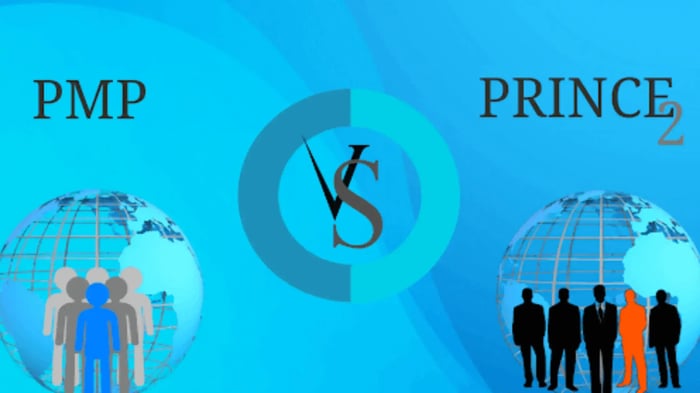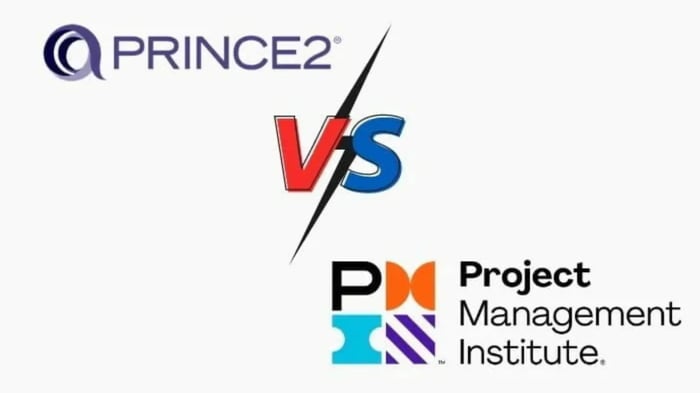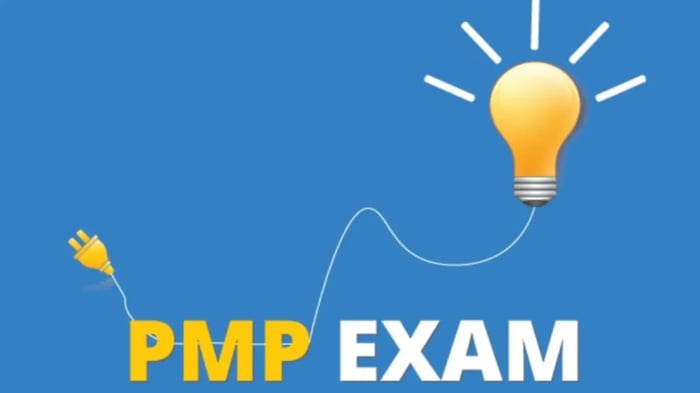Table of Contents
- What is PMP Certification?
- What is PRINCE2 Certification?
- PMP Certification vs PRINCE2: Key Differences
- PMP Certification vs PRINCE2 Cost: What to Expect
- The Pros and Cons of PMP Certification
- The Pros and Cons of PRINCE2 Certification
- Industry-Specific Use Cases: PMP Certification vs PRINCE2
- Choosing Between PMP and PRINCE2
- FAQs
Let’s settle the age-old debate: PMP certification vs. PRINCE2. Are you ready to pick your project management weapon of choice? Whether you're aiming for project management dominance or just looking to upskill, choosing between PMP (Project Management Professional) and PRINCE2 (PRrojects IN Controlled Environments) can feel like deciding between two superhero suits. Both certifications are powerful, but each brings its own set of advantages, methodologies, and career growth opportunities. So, let’s break it down in the most engaging way possible—trust us, by the end, you’ll have your decision made!
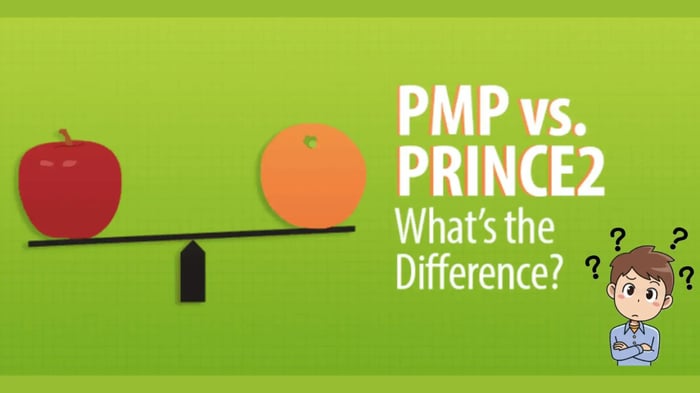
What is PMP Certification?
PMP Certification is one of the most prestigious and globally recognized certifications for project managers. Offered by the Project Management Institute (PMI), PMP focuses on project management best practices, as outlined in the PMBOK Guide (Project Management Body of Knowledge). The PMP certification covers a range of project management principles, from initiating and planning to execution and monitoring.
With a PMP certification, project managers can confidently lead teams, manage budgets, and ensure project success across industries. Whether you're managing IT projects, construction, or product development, PMP has your back.
What is PRINCE2 Certification?
PRINCE2 is a widely recognized certification in the world of project management, primarily used in the UK, Europe, and parts of Asia. Standing for PRojects IN Controlled Environments, PRINCE2 is a process-based methodology that provides a structured framework for project management. This certification focuses on the organization, control, and management of projects.
PRINCE2 is unique in its focus on stages and detailed processes, ensuring that a project is well-defined, risks are minimized, and responsibilities are clear from start to finish. Its scalability allows it to be adapted to any size of project, making it a flexible and dynamic choice for project managers.
PMP Certification vs PRINCE2: Key Differences
When it comes to PMP vs. PRINCE2, the methodologies and frameworks are the main differences. Here’s a breakdown:
Feature | PMP | PRINCE2 |
Focus | Process-based with emphasis on knowledge areas | Stage-based methodology focused on governance and control |
Global Reach | Widely recognized, especially in the US, Canada, and Latin America | More common in the UK, Europe, and Australia |
Approach | Adaptable to various industries and projects | Prescriptive with defined stages and processes |
Certification Levels | PMP and CAPM (Certified Associate in Project Management) | PRINCE2 Foundation and PRINCE2 Practitioner |
Target Audience | Professionals with project management experience | Suitable for all levels, from beginners to experts |
Framework | Project management knowledge and best practices | Focused on clear roles, stages, and processes |
Methodology | Knowledge-based (PMBOK Guide) | Process-based (PRINCE2 methodology) |
Which Certification Is Best for You?
When deciding between PMP vs. PRINCE2, it’s important to consider your career goals, location, and industry:
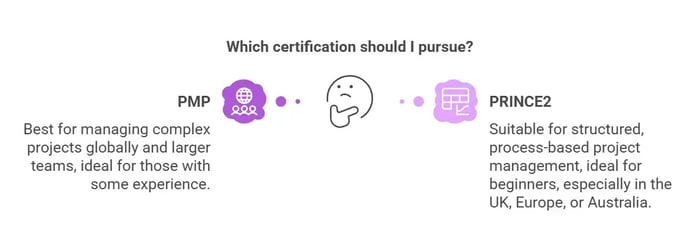
PMP: Best for those looking to manage complex projects across industries globally, especially if you want to manage larger teams or companies. It’s great for those with some experience in project management.
PRINCE2: Ideal if you are working or planning to work in the UK, Europe, or Australia. It’s well-suited for those who prefer a structured, process-based approach to managing projects, and it’s suitable for beginners as well.
PMP Certification vs PRINCE2 Cost: What to Expect
Cost is an important factor when deciding between PMP vs. PRINCE2. Let’s compare:
Certification | Cost | Exam Fee | Renewal Fee |
PMP Certification | $405 - $555 | $405 (members), $555 (non-members) | Every 3 years - Earn 60 PDUs |
PRINCE2 Foundation | $400 - $600 | $400 | No renewal required for Foundation |
PRINCE2 Practitioner | $700 - $1,000 | $700 | Every 3-5 years – PRINCE2 Practitioner |
Pro Tip: Consider APMIC's affordable project management certifications as an alternative that delivers the same value but at a better price. You’ll find complete guides on affordable certifications in our Project Management Certification Course.
The Pros and Cons of PMP Certification
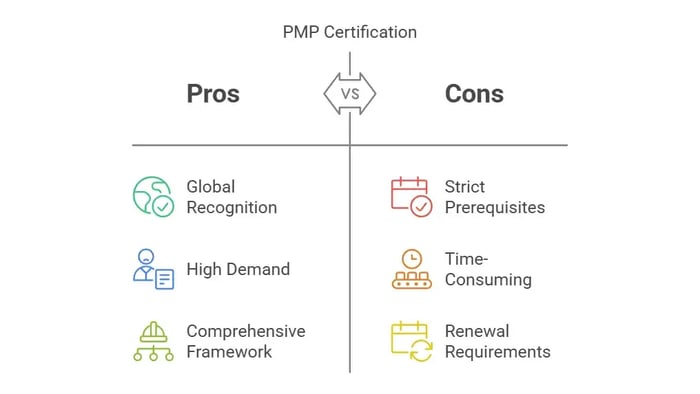
Pros:
Global Recognition: The PMP certification is widely accepted across industries and countries.
High Demand: Project managers with PMP certification are highly sought after, which can increase job opportunities and salaries.
Comprehensive Framework: The knowledge areas in PMP provide a solid foundation for managing any type of project.
Cons:
Strict Prerequisites: PMP requires project management experience (typically 3-5 years).
Time-Consuming: The PMP exam is extensive and can take significant time to study for.
Renewal Requirements: PMP certification requires continuous Professional Development Units (PDUs) to maintain.
The Pros and Cons of PRINCE2 Certification
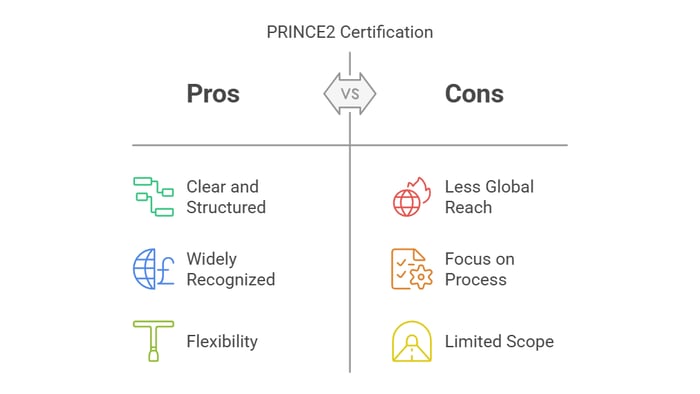
Pros:
Clear and Structured: PRINCE2’s process-based methodology is easy to follow.
Widely Recognized in Certain Regions: Especially beneficial in the UK, Europe, and Australia.
Flexibility: PRINCE2 can be adapted for any project, no matter the size.
Cons:
Less Global Reach: It is not as widely recognized in the US and other parts of the world.
Focus on Process: The rigid framework may not suit those who prefer a more flexible approach.
Limited Scope: More focused on governance and control, which may not align with every project manager’s needs.
Industry-Specific Use Cases: PMP Certification vs PRINCE2
Both certifications have strengths depending on the industry. Let’s break it down:
PMP in IT
In IT projects, PMP is ideal. It provides flexibility, which is essential when managing agile and complex projects. From software development to IT infrastructure, PMP-certified managers can adapt the PMBOK framework to various agile approaches.
PRINCE2 in Construction
PRINCE2 is a go-to certification for managing construction projects. Its structured methodology, with a focus on process and stage-by-stage progression, fits well with the predictability required in construction management.
PMP in Healthcare
In healthcare, project management is often highly collaborative and interdisciplinary. PMP certifications help project managers oversee large teams, budgets, and timelines. PMP's focus on risk management and stakeholder engagement makes it invaluable in environments with high stakes.
PRINCE2 in Public Sector Projects
PRINCE2’s emphasis on governance and clear roles makes it well-suited for the public sector, including government projects, where there's a need for transparency, audit trails, and clear accountability. PRINCE2’s process-driven approach is ideal for ensuring all aspects of public projects are well-controlled.
Choosing Between PMP and PRINCE2
When choosing between PMP vs. PRINCE2, consider your current career stage and goals:
If you’re an experienced project manager, PMP may be the better fit as it’s ideal for those looking to expand their knowledge across a wide range of project types.
If you’re new to project management or prefer a structured, process-driven approach, PRINCE2 may be the perfect choice to build a solid foundation in project management.
Additional Resources: PMP and PRINCE2 Certification
For those looking to gain insights on how to prepare for these certifications, check out our additional resources:
Conclusion: Why Choose APMIC’s Project Management Certifications?
Both PMP and PRINCE2 are fantastic certifications for project managers. However, if you’re looking for a comprehensive, affordable, and globally-recognized certification, APMIC offers an excellent option. Whether you’re new to project management or looking to advance, our certifications provide the tools and knowledge needed for success in the industry.
Discover the best project management certifications at APMIC today! 🚀
FAQs
What’s the main difference between PMP and PRINCE2?
PMP is a knowledge-based certification with a focus on project management principles. PRINCE2 is a process-based methodology with a strong emphasis on governance and control.
Which certification is better for international projects?
PMP is recognized globally, making it ideal for those working on international projects.
Can PRINCE2 be used in agile environments?
Yes, PRINCE2 has an agile version called PRINCE2 Agile.
How much does the PMP exam cost?
The PMP exam fee ranges from $405 to $555, depending on membership status.
How long does it take to get PRINCE2 certified?
PRINCE2 Foundation can be completed in a few days; PRINCE2 Practitioner can take up to 5 days of study.
Is PMP better than PRINCE2 for career growth?
PMP offers broader global recognition, especially for senior-level positions.
How long does the PMP certification last?
PMP certification is valid for 3 years, and you need to earn 60 PDUs to renew.
Can I switch between PMP and PRINCE2 during my career?
Yes! Many professionals obtain both certifications as they offer different but complementary skills.

